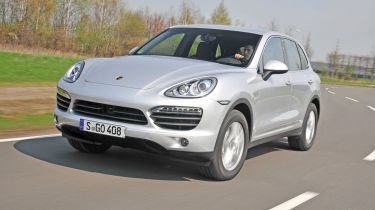Porsche Cayenne S Hybrid
We deliver our verdict on all-new petrol-electric SUV – the most efficient Porsche yet

The Cayenne S Hybrid is very impressive. It feels as powerful as the V8 model, yet is far more economical and sits in a lower tax band. The downside is that it also carries a £4,000 premium, but some buyers will be happy to pay this to be exempt – for now – from the congestion charge.
You may think the most interesting thing about Porsche’s facelifted Cayenne is that it’s more attractive inside and out, as well as better to drive than ever before. But while those attributes are well worth a mention, customers are likely to focus on something else when they visit a showroom.
The big news is that the SUV is now available as a petrol-electric hybrid – a first for a production Porsche. And with CO2 emissions of 193g/km, this variant is the cleanest model in the company’s range. So, what’s the 4x4 like to drive – and can it really achieve the claimed 34.4mpg?
Video: watch CarBuyer's video review of the Porsche Cayenne
[[{"type":"media","view_mode":"content_narrow","fid":"69262","attributes":{"alt":"","class":"media-image"}}]]
Badged Cayenne S Hybrid, the newcomer gets a 325bhp supercharged 3.0-litre V6 petrol engine, hooked up to an electric motor. The two combine to deliver an impressive total of 374bhp, giving 0-62mph in 6.5 seconds – almost as fast as a Boxster – and a top speed of 150mph.
More reviews
Car group tests
- Porsche Cayenne vs BMW X5 2024 twin test: sporty plug-in hybrids battle for supremacy
- Audi SQ8 vs Porsche Cayenne Coupe GTS
In-depth reviews
Road tests
- New Porsche Cayenne Turbo E-Hybrid with GT Package review: fast but not as much fun as the GTS
- New Porsche Cayenne GTS 2024 review: big SUV brings real driving thrills
- New Porsche Cayenne E-Hybrid 2024 review: an almost perfect family SUV
- New Porsche Cayenne 2023 facelift review
- New Porsche Cayenne E-Hybrid 2023 facelift review
- New Porsche Cayenne Coupe facelift prototype review
Despite weighing 2,240kg, the big Porsche can travel on battery power alone at up to 37mph for short distances. You just have to be gentle with your right foot to prevent the V6 cutting in.
Be too heavy on the throttle, and fuel economy will obviously suffer. The key to getting the most out of the hybrid technology is to alter your driving style. However, when you do want to blast away from the lights, the transition from electric power only to petrol and electric is extremely smooth.
From behind the wheel, this ensures the Cayenne feels like a car with a conventional engine.
It helps that it has a traditional automatic box, rather than a CVT.
What’s unusual, though, is Porsche’s new Sailing mode.
It works to save fuel, and makes its presence felt as you lift off the throttle. The car instantly senses the deceleration – and the V6 is disconnected from transmission to eliminate the fuel-wasting effect of engine braking.
Meanwhile, the electric motor acts as a generator to provide power for the steering, brakes and on-board functions. Sailing happens at speeds up to 97mph, and because of the silence it generates – you are
just freewheeling, effectively – it takes a while to get used to.
So do the Cayenne S Hybrid’s regenerative brakes. Touch the pedal lightly, and the first bit of stopping performance is served up by the generator for recharging the battery. Push harder, and the normal brakes start to bite.
The transition between the two phases is not entirely smooth, so to slow the car down gently, you feel you need to compensate for the lack of progression in the pedal. But you can forgive these idiosyncrasies when you check your fuel economy. During our drive, we returned 34mpg exactly.
So the Cayenne S Hybrid really can achieve Porsche’s figures – as long as you are willing to drive conservatively. And if you’re not, you still have an SUV with similar performance to the normal V8, but with less road tax to pay. Plus, it’s exempt from London’s congestion charge – at least until a likely CO2 ceiling is imposed later this year.
Rival: Lexus RX450h
The RX set the hybrid SUV benchmark. But while it’s £14,000 cheaper than the new Porsche, it trails on performance and handling, and can’t match the new Cayenne for desirability.



